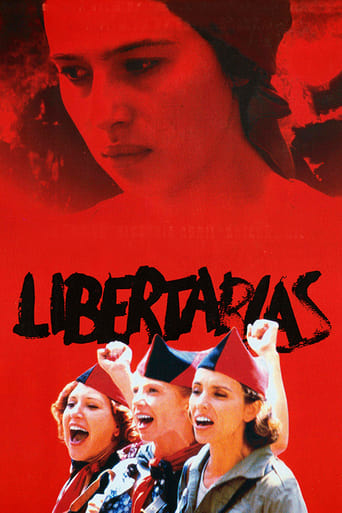meddlecore
This movie tells the story of the last battle that has been fought with hopes of forming a Utopian society... a libertarian communist society based on anarchy. Everyone is equal. Everyone is a soldier. There are no rankings, everyone fights as an equal. Even men and women are seen as equals. In times when we are beginning to see the failings of a capitalist society, this movie is an inspiration to show that it is possible to form a collective society in which everyone is free and equal. It makes you contemplate the argument of are you really free in a democratic society? This movie takes a particularly feminist perspective, following the association of free women, a branch of the revolution in which the women were just as devoted to the cause as the men, and expect to be treated equal, even if it means they will fight and die. This movie should be an inspiration to us all as it becomes obvious that a liberal capitalist life is unsustainable..it is a must see, especially if you enjoy political movies. 8.5 out of 10.**If you like this movie check out Salt of the Earth, about the strikes at the zincs mines in new Mexico by Mexican workers...also a must see!**
m-kennedy
I was at home attempting to plan a lecture for students. I was attempting to explain the Enlightenment, humanism and anti humanism. I particularly wanted to make an emphasis on how 'progressive' post structural and postmodern thinking has fragmented working class struggle into dozens of small micro struggles. The essence of this framework is that whilst genuine attempts are being made to create a new collective social order and a new common sense some left wing intellectuals impose their 'progressive' credentials to position themselves as the vanguard of change. Whilst the 'progressives' are engaged in a never ending but fragmented debate over the divine right over which fragment of the intelligentsia will lead the struggle the conservatives are able to organize and win the day.Whilst attempting to put this lecture together Libertarias appeared on my television set. It was in Spanish with English sub-titles. I couldn't believe my luck as it explained. Marxism, Socialism, Anarchy, Feminism, Fascism, Conservative, Progressive, Humanism, Anti-Humanism, Religion, the Monarchy. I have to confess that my lecture eventually comprised of playing the movie Libertarias to students.The outcome was very impressive. It explained the conflicts and contradictions associated with any social struggle.Years later I was to visit Spain and as I travel-led through Barcelona. Madrid and Toledo the movie took on a new meaning. Perhaps this is a flawed performance; perhaps it focuses too much on the struggle of women. What it does more than anything else is leave a never-ending impression of the sacrifices we have to make in order to bring about change.
rachid-2
A tender and cruel film. Paradoxical? No when a real story is told. And the story occurs in Spain during the civil war. For this short summer of anarchy, in the most beautiful of the popular feats of the century, the director conducts an affectionate and anarchical look. He make us to remember that in revolutionary periods, revolutionaries are needed. But does not permit that we forget the monumental inefficiency of anarchism.
Carl_Stieren
When Maria, the former nun, agrees to go to the front with the anarachist batallion, she does it more out of loyalty to the militiawoman, Pilar, who befriended her. When their camp comes under fire from the Fascists on the other side of the valley, they all dive for the trenches. Maria alone runs out, but she doesn't grab the machine guns left behind -- she carries the pot of stew to feed them. When she goes to the top of the trenches, it is a megaphone she lifts - not a rifle. Her words to the Fascists are "In the name of God, lay down your rifles". (At that point, the intellectual militiaman mumbles, "They'll think it's one of theirs"). At the killing of a bishop by an anarchist execution squad, which she witnesses, she says, "Killing is a sin." She says the same thing when a lamb is about to be slaughtered to feed the group. (This is more symbolism -- a la agnus deo - than vegetarianism.) Her role however, is more than a simple stretcher-bearer or noncombatant at the front. She really does argue against killing. No one else speaks up for this viewpoint - everyone seems resigned to violent conflict as a means of settling what society they will have, fascists, anarchists, communists, democrats and all.What do others think?



